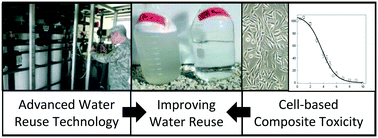Composite toxicity assays for enhanced assessment of decentralized potable reuse systems†
Abstract
Decentralized direct potable reuse systems present new opportunities and potential risks for resilient and sustainable facilities of the future. This study explored the use of advanced cell-based composite toxicity methods to augment the assessment of known and unknown chemicals in waters from decentralized direct potable reuse systems. The decentralized reuse systems were equipped with newly-developed low energy membranes and advanced oxidation technologies for the control of the full spectrum of contaminants found in wastewater effluent. The feed and product waters from these systems were tested for conventional chemical contaminants, personal care and pharmaceutical products, composite cytotoxicity and composite genotoxicity. The composite toxicity assays confirmed the high degree of purification in the decentralized potable reuse systems and responded accordingly when known contaminants were detected at levels approaching or exceeding regulatory limits. The composite toxicity assays identified potential risks for water samples that would not be considered contaminated or a risk to health based on conventional contaminant monitoring. Unknown disinfection byproducts appeared to be the causal factors due to increases in cytotoxicity that occurred during the disinfection step. It is recommended that composite toxicity assays be considered to augment validation and optimization of direct potable reuse systems to minimize potential health risks associated with the additive effects of known and unknown contaminants.

- This article is part of the themed collection: Drinking water oxidation and disinfection processes


 Please wait while we load your content...
Please wait while we load your content...